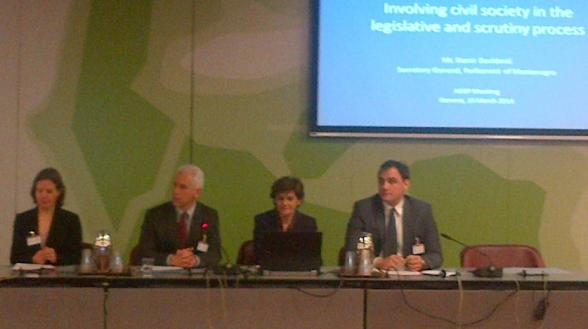Secretary General of the Parliament of Montenegro Mr Damir Davidović presented the legal framework for inclusion of the civil society in the legislative process at the parliamentary level, as well as in the part of the process preceding formulation of the proposal for a law, which was being done at the level of the Government. Mr Davidović especially emphasised participation of the representatives of the NGO sector in the meetings of the parliamentary committees, where, in 2013, about 280 attendances and participations of the representatives of about 70 organisations were recorded. Mr Davidović said that the initiatives and suggestions addressed to the committees represented a significant contribution of civil society to fulfilling the oversight role of the Parliament.
A part of the address of the Secretary General of the Parliament of Montenegro was dedicated to openness and transparency of work, including the Parliament’s sittings and the meetings of the committees being open to public, publishing of all documents created during the legislative procedure and other information from the work of the Parliament, as well as all data relating to the use of the budget funds.
Mr Davidović also presented several projects, which were being implemented or had been launched in cooperation with the NGOs, such as Democracy Workshops, Children’s Parliament, Internship Programme, Open Parliament, National Convention on European Integration, as well as several projects implemented in cooperation with foreign organisations. Mr Davidović stated that a significant form of cooperation with the NGOs was also done through responses to requests for free access to information, submitted by the NGOs in 95% of the cases.
In discussion following the presentation of Mr Davidović, secretaries general of several parliaments expressed their views that in the Parliament of Montenegro there was a wide spectrum of measures for inclusion of civil society in the parliamentary work. Secretary General of Bundestag pointed out at the German parliamentary practice, in which, contrary to the committee meetings of the Parliament of Montenegro, the committee meetings were closed to public. Secretaries general wanted to know how the Parliament of Montenegro regulated hiring of experts for the needs of the committees, as well as how the political parties allowed participation of the representatives of the civil society in discussions at the committee meetings.
Meeting of the Association of Secretaries General of Parliaments (ASGP), as an advisory body to the Inter-Parliamentary Union (IPU), is being held simultaneously with the session of the IPU, from 17 to 20 March in Geneva. During the Association meeting, the secretaries general will have an opportunity to share experiences and opinions on numerous issues and challenges encountered in various segments of the daily work of the parliamentary administrations. From the viewpoint of the Parliament of Montenegro, the presentations regarding the code of ethics were especially interesting, which started the debate on reasons behind adopting the code, its contents, relation with legislation in that field and the manner of implementation of the code of ethics.
In this meeting, the following was also considered: current parliamentary issues within general debates dedicated to coordination of assistance and support to foreign parliaments, parliamentary communication and public relations and returning the trust of the public in the parliament.








